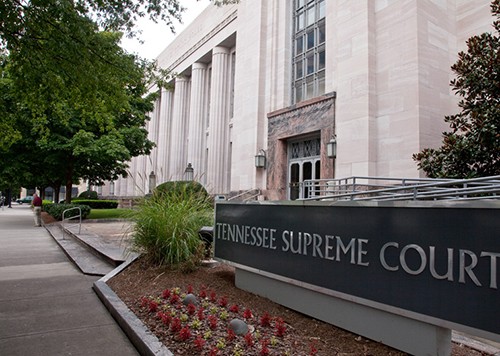
Two cases heard Wednesday by the Tennessee Supreme Court could serve to further chip away at the constitutional rights of Tennesseans.
Both cases will examine the good faith exception to the exclusionary rule. More simply put, defendants in both cases claim that police illegally gathered evidence in their cases by illegally drawing their blood or searching their house. Both were convicted with that evidence and both want new trials because police violated their rights to unreasonable searches and seizures. This is the heart of the exclusionary rule.
But police officials in both cases said they made simple, human mistakes and didn’t willingly break the rules. They argue — and courts have agreed with them — that this evidence should still be used (and their convictions should still stand) because the cops acted in “good faith” and that they made what amounts to clerical errors in processing the cases.
In State v. Angela Faye Daniel, a Franklin police officer failed to give Daniel a search warrant. In 2014, she was pulled over and the officer smelled alcohol. She refused a sobriety test and a blood alcohol test.
The officer got a warrant and took Daniel to a medical facility where her blood was drawn. A grand jury indicted her for driving under the influence but she argued at trial that the officer did not give her a copy of the search warrant and that the blood test results should be thrown out as evidence in the case.
In the other case to be heard Wednesday, a woman claims police unlawfully searched her house. Prosecutors used that evidence to convict Lindsey Brooke Lowe of killing her newborn twins.
Lowe’s parents discovered the dead children in her Sumner County home, according to court papers. Police were called and, later, a judge signed three copies of the search warrant for Lowe’s home at 11:35 a.m. on September 2011. However, the judge accidentally wrote “11:35 p.m.” on one of them.
A trial court found procedure was violated (as all three copies weren’t identical) but concluded it was an “unintentional clerical error,” and said “if there was ever a case for a good faith mistake or exception, this is the case.”
The U.S. Supreme Court already allows such exceptions. However, the Tennessee Supreme Court only cracked the door on the issue last year in a couple of decisions that allowed a “limited” good faith exceptions. The two cases heard Wednesday would widen what is allowed now to include technical errors.
If the decisions allow these types of exclusions, it would give law enforcement more leeway for error in criminal searches, the rules of which are constitutionally guaranteed.
Tennessee Justice Sharon G. Lee wrote that allowing such an exception in a case last year was “ill-conceived for many reasons.”
“The adoption of this exception for a constitutional violation erodes our citizens’ rights to be free from unreasonable searches and seizures as guaranteed by the United States and Tennessee Constitutions,” Lee wrote in a dissenting opinion.
The Tennessee General Assembly passed a 2011 law that allows such exemptions. State Supreme Court Justices have also asked both parties to be ready Wednesday to argue whether or not that law — the Exclusionary Rule Reform Act — violates the separation of powers clause of the Tennessee Constitution.